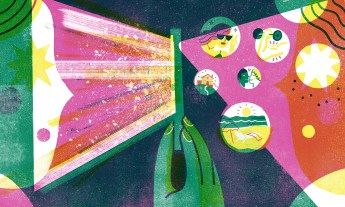
We all have an area, closet, shelf or drawer that remains a mess, despite our best efforts. Well, these tips might finally help you clear it, from author Gretchen Rubin.
This post is part of TED’s “How to Be a Better Human” series, each of which contains a piece of helpful advice from someone in the TED community; browse through all the posts here.
1. To see clutter with fresh eyes, take a photograph.
If you’re having trouble getting started, try taking photos of an area and evaluating what you see. Somehow, a photograph helps us to see a space anew: It changes our perspective and gives us a measure of detachment that can enable us to decide what items should stay and what need to go.
Bonus: Once you’ve cleared the space, take photos of it so you can compare “before” and “after” images. It’s a big morale booster to see visual proof of what you’ve accomplished.
2. Go ahead and abandon a project.
One source of clutter in our homes, and a significant drain on our energy, is the uncomfortable presence of unfinished projects. Whenever we see evidence of them, we get a jolt of guilt or annoyance: “I should finish that,” “I need to deal with that,” “When am I going to find the time to get that done?” These projects can take many forms: knitting experiments, gardening plans, half-built Lego castles, binders full of untried recipes, woodworking projects, giant puzzles, dictionaries for languages we want to learn …
Unfinished projects contribute to clutter because we often leave them out in the open as a remind to finish them. Push yourself to complete an unfinished project — or just call an end to it. The easiest way to complete a project is to abandon it and clear it away. Get that stuff off your shelf and off your conscience.
3. Move your clutter out of context.
When we see objects settled into a particular place over time, it becomes hard to imagine where else they might go. So put your clutter into a new context. Pick up the items, gather them in a box, and carry it to a well-ordered room. Once you detach things from their settled places, it’s much easier to decide what to do with them.
4. Consider the ex factor.
If you can’t decide whether you should keep an item of clothing, ask yourself, “If I ran into my ex on the street, would I be happy if I were wearing this?” Often, the answer will give you good clues.
5. Forecast the future.
Imagine that it’s far in the future and your relatives have arrived to clean out your house. What items will they want and what items will they give away, toss or recycle? You can make their job in the future easier by dealing with your possessions now, instead of foisting that job on them.
Excerpted with permission from the new book Outer Order, Inner Calm: Declutter and Organize to Make Room for Happiness by Gretchen Rubin. Published by Harmony, an imprint and division of Penguin Random House LLC, New York. Copyright © 2019 by Gretchen Rubin.











